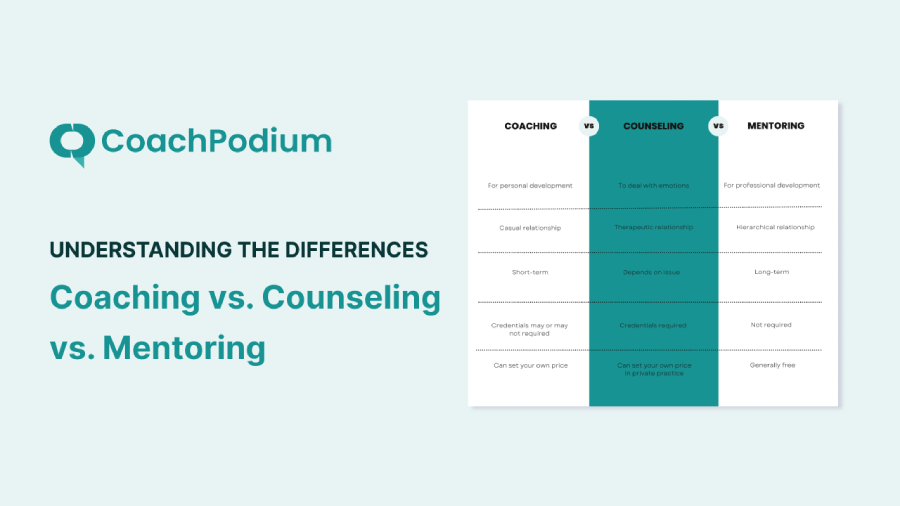Are you someone with a passion for helping others achieve their goals and overcome challenges? If so, you may have used coaching, counseling, and mentoring to help people.
However, you may have encountered various issues while employing these approaches. Knowing when to use each approach can be a game-changer in your sessions.
In this article, you will explore each of these approaches and find out which is best for you to start your career or enhance your existing one.
We’ll unpack an overview, draw comparisons, and highlight the unique benefits and limitations of coaching, counseling, and mentoring. By the end, you’ll have a clearer perspective to tailor your approach based on your goals and those of your clients.
Be sure to read the article to the end!
What is Coaching?

Coaching is a process to help someone improve their performance or skills in a specific area. In this approach, you provide feedback, guidance and support but must tell your client what to do. Coaching is usually short-term and focused on a particular goal or challenge.
For example, you use coaching if your clients want to:
- Improve their communication skills.
- Manage their time better.
- Start a new business.
- Lose weight.
- Develop a positive mindset.
You can help identify your client’s strengths, weaknesses, opportunities and threats. This enables you to create a realistic and actionable plan to achieve their goals. You track progress, hold them accountable, and celebrate their successes.
Coaching works on the assumption that your clients have the potential and the resources to solve their problems. It works great when you provide some guidance and encouragement to them. It would help if you asked powerful questions to your clients to find answers.
Curious about Life Coaching?
Check out our comprehensive guide on ‘What is a Life Coach?’ to understand this transformative profession better.
What is Counseling?

Counseling is a form of therapy that helps people to cope with emotional or psychological issues. In this approach, you listen to the client’s feelings and thoughts and allow them to explore their options to find solutions.
Counseling is usually short-term and focused on resolving a specific problem or crisis.
For example, you use counseling if your clients:
- Have experienced a loss or a trauma.
- Going through a divorce or a breakup.
- Struggling with addiction or substance abuse.
- Have low self-esteem or confidence.
- Feel overwhelmed or hopeless.
You can provide a safe and confidential space to express their feelings and help them understand the root causes of their issues. You also help them to develop coping skills, challenge negative beliefs, and change unhealthy behaviors.
What is Mentoring?

Mentoring is a relationship between a more experienced and a less experienced person. In this approach, you share your wisdom, insights and advice with the mentee, who can learn from your experience and network.
Mentoring is usually long-term and focused on professional development.
For example, you use mentoring to help your mentees to:
- Advance their career.
- Learn new skills or knowledge.
- Expand their network or opportunities.
- Navigate organizational culture or politics.
- Find their purpose or passion.
You act as your client’s role model or guide in this approach. By sharing your stories, lessons learned, best practices, and feedback, you inspire your mentee to carry out tasks. You also introduce mentees to relevant people or resources to help them grow.
Attributes of Coaching, Counseling and Mentoring
As you can see, coaching, counseling and mentoring are different ways of helping people grow and achieve their goals. They differ in some significant ways:
1. Focus
The focus of coaching is to help clients to learn skills for reaching particular goals. Moreover, this method improves the client’s work performance.
Counseling focuses on helping clients to develop resilience towards emotion. It helps to offer strategies to deal with emotional trauma.
You focus on the professional development of mentees by guiding them in the mentoring method. You provide the necessary answers to the questions about the tasks and provide general support and direction to the mentee.
2. Duration
Coaching is short-term in nature. You set a goal with your clients. Coaching comes to an end after achieving that goal.
The time duration for counseling depends on the person taking the counseling. Usually, it is longer in comparison to the coaching method. Some client may take counseling for their whole life, and some in specific situations.
Mentoring is of longer duration among the three. The time in mentoring finishes when the mentee gathers enough skills. So, the duration depends on the level of skills of the mentee.
3. Relationship
In coaching, you have equal partnership and casual relations with your client. You may have a one-on-one relationship or a group-oriented relationship.
Counseling, on the other hand, has a therapeutic relationship with the client. You have a formal and professional relationship with this method. You can be friendly enough so that your clients share their thoughts and feelings.
However, mentoring has a hierarchical relationship between a senior and a junior. You work with your mentee on a one-on-one basis.
4. Method
Coaching uses powerful questions to find solutions. You use methods such as listening, reflecting, and planning.
Counseling uses primarily therapeutic methods. It uses Cognitive Behavioral Therapy (CBT) techniques to change thoughts and behaviors. You also use listening and reframing methods.
In mentoring, you use stories and advice to share wisdom and experience with your mentee.
5. Outcome
Coaching improves your client’s performance or skill. Your primary objective for your client is personal growth, increased confidence, productivity and self-awareness.
Counseling leads to the improvement of mental health and overall well-being by helping them heal the trauma.
The mentoring method improves the career prospects and opportunities of mentees.
6. Credentials
You don’t need credentials or certification to start your career in coaching. However, it increases your validity and establishes your expertise in the field among potential clients.
You must have a proper education and credentials to start your career in counseling. Due to the reason of dealing with sensitive people, you must bear a valid license to practice.
Mentoring, also like coaching, does not require you to have certification. It is the way to guide your mentee to perform the task efficiently and effectively. However, you require experience and expertise in the field you are mentoring.
7. Approach
The approach used in coaching is that the client has all the answers and is an expert in his life. You guide them to reach their goal by asking appropriate questions.
In counseling, you provide your personal expertise to your client in the psychological, mental, or emotional aspects on a deeper level. This way, you help them to cope with the deep-rooted issues.
You are giving your wisdom and expertise to your mentee to tackle the issue faced in work life. In mentoring, you teach your mentee what to do and how to do it.
8. Cost Aspect
You can set your own price in your coaching business, making it lucrative.
You can only set the price in counseling if you do your private practice. Sometimes, laws and policies make counseling mandatory, which may cause government intervention in the price aspect.
Mentoring is generally unpaid. In this method, senior staff trains the new employees to familiarize them with the work culture.
9. Challenges
Coaching is an unregulated industry, so you gain trust by establishing training and credentials to gain a competitive advantage.
In counseling, the great challenge is that people only attend the session once they become deeply affected or for a mandatory cause.
The major challenge of mentoring is the time availability of senior-level employees to build relationships with mentees.
Benefits and Limitations
Each option has benefits and limitations. Here are some of them.
Benefits of Coaching
- Develop skills to deal with people of different age groups, hierarchies, and cultures.
- Gain valuable experiences in a short amount of time.
- Expand your professional connections through your clients.
- Gives you the flexibility of in-person or online sessions, defying geographic restrictions.
- Can enter professionally in a short amount of time.
- Helps in improving leadership skills.
Limitations of Coaching
- Management of different clients with different personalities becomes difficult.
- Impacts emotionally when you and your clients cannot achieve goals as intended.
- Need help finding work-life balance.
Benefits of Counseling
- Provides you job satisfaction as you help deeply traumatized people.
- Can work in various settings such as schools, hospitals, communities, and private practices.
- Gives you financial security as you can set your own price in private practice.
- Aids in your personal growth due to learning about yourself during the counseling session.
- Develop an understanding of psychological issues, thus enhancing resilience to these types of issues.
Limitations of Counseling
- Stressful work environment as people with deep trauma come for help.
- A feeling of loneliness as the relationship between you and your client is one-sided.
- Inconsistent and unpredictable work hours as you have to work on-call or off-hours.
- Requires extensive study to start practicing.
Benefits of Mentoring
- Gain a professional connection with the mentee, which exceeds company relations.
- Enhance your leadership skills.
- A feeling of satisfaction for the mentee’s accomplishment.
- Showcase your mentorship skills and create a positive impression, thus helping in financial benefit.
Limitations of Mentoring
- When forced mentoring happens, you may find difficulty in helping your mentee at an optimum level.
- Frustration occurs when the mentee needs a faster learning curve, resulting in less effective guidance.
- Mentees may need more conviction and engage with you effectively.
- Mentees may be overly dependent on you.
Quick Comparison Between Coaching, Counseling and Mentoring
| Attributes | Coaching | Counseling | Mentoring |
| Focus | Personal development | To deal with emotions | Professional development |
| Duration | Short-term | Depends on the issue | Long-term |
| Relationship | Casual | Therapeutic | Hierarchical |
| Method | Questioning | Listening, therapeutic | Sharing experience and wisdom |
| Outcome | Personal growth | Emotional maturity | Professional growth |
| Credentials | Not required, but you may have | Required | Not required |
| Approach | The clients have all the answers | You have psychological expertise | You are the expert and have wisdom |
| Cost Aspect | Can set your own price | Can set your own price in private practice | Generally free |
| Challenges | Unregulated industry | Taboo regarding mental health | Time constraints of senior |
Conclusion
Coaching, counseling and mentoring are different ways of helping people grow and achieve their goals. Each of these approaches has its own benefits and limitations. They also differ based on attributes such as focus, duration, relationship, and more.
Your aim may be to empower the individual for their personal, professional, or emotional development. You may consider your goals, preferences, expectations, and resources to decide which is best for you.
We hope this article has helped you understand the difference between coaching, counseling and mentoring so you can incorporate this knowledge into your practice.



